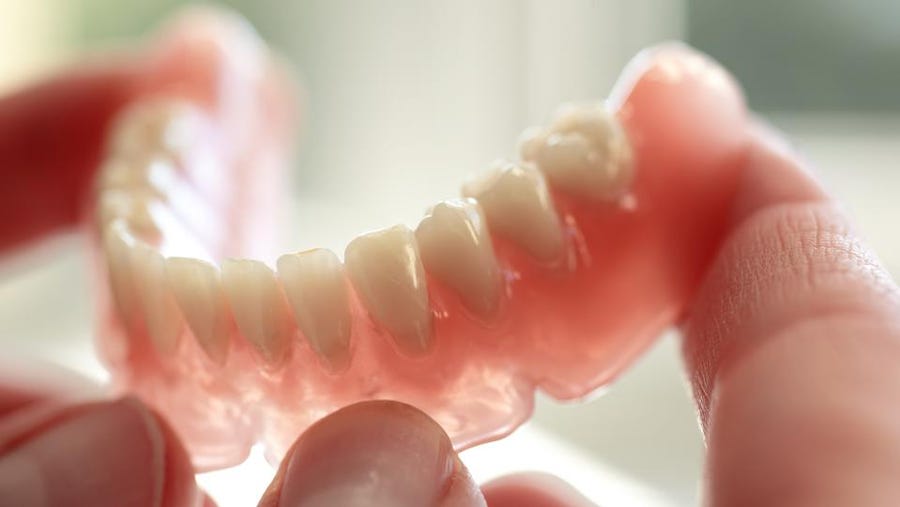Introduction to Dentures
Dentures are artificial replacements for natural teeth. They can be used to restore the function and appearance of your smile if you have lost all or most of your teeth. There are different types of dentures available, and the type that is best for you will depend on your individual needs and preferences.
Complete Dentures: Complete dentures are used when all of the natural teeth have been lost. They consist of a set of false teeth attached to a pink base that covers the gums. Complete dentures are held in place by suction or dental adhesive.
Partial Dentures: Partial dentures are used when some natural teeth remain. They consist of a set of false teeth attached to a metal framework that fits around the remaining natural teeth. Partial dentures are held in place by clasps or dental adhesive.
Implant-Supported Dentures: Implant-supported dentures are used when some natural teeth remain, but there is not enough support for traditional partial dentures. They consist of a set of false teeth attached to dental implants that are surgically placed in the jawbone. Implant-supported denture tend to be more stable and comfortable than other types of denture, but they are also more expensive.
What type of denture is best for you will depend on your individual needs and preferences. If you have any questions about which type of denture is right for you, feel free to ask your dentist or dental prosthetist
Different Types of Dentures
When you lose your natural teeth, whether from gum disease, tooth decay or injury, dentures can help improve the function and appearance of your smile. But did you know that there are different types of dentures available? Here’s a quick guide to the different types of dentures and what best fits you:
Complete Dentures – These are used when all of the patient’s natural teeth have been removed. The denture is made in advance and is fitted once the teeth have been removed and the gums have healed.
Partial Dentures – Partial dentures are used when some of the patient’s natural teeth remain. The partial denture fills in the gaps left by the missing teeth.
Immediate Dentures – Immediate dentures are placed immediately after the removal of natural teeth. Since immediate dentures are made in advance, they don’t fit as well as complete or partial dentures that are made after the teeth have been removed. Immediate dentures also require more adjustments as your gums heal.
Dental Implants – Dental implants are a more permanent solution to tooth loss. A metal post is surgically implanted into the jawbone, and then a false tooth is attached to the post. Dental implants feel and look like natural teeth and don’t require any special care beyond regular brushing and flossing.
What is the Best Type of Denture for Me?
There are different types of dentures available on the market and choosing the best type of denture for you depends on your individual dental needs. If you are missing all of your teeth, then a full denture is the best option for you. A full denture is a set of false teeth that are mounted on a gum-colored base and fit over your gums. Full dentures are held in place by natural suction or with the help of dental adhesives. If you are only missing some of your teeth, then a partial denture is the best option for you. A partial denture consists of false teeth that are attached to a metal framework and fit into the spaces left by your missing teeth. Partial dentures are held in place by clasps that attach to your natural teeth. Just like dentures, today, several dental filling materials are available depending on the the clients request and the dentists approval.
How to Care for Your Dentures
If you have dentures, it’s important to take good care of them. Here are some tips on how to care for your dentures:
-Rinse your dentures after eating and before going to bed.
-Brush your dentures daily with a soft-bristled toothbrush and nonabrasive toothpaste. Be sure to brush all surfaces, including the teeth, gums, and roof of the mouth.
-Soak your dentures overnight in a mild cleansing solution.
-See your dentist regularly for checkups and cleanings.
Conclusion
Dental prosthetics, such as dentures and partials, can be complex and challenging to understand. But with the right information, you can make an informed decision about which type of denture is best suited for your needs. Just like choosing the best type of dentures for you, patients are also looking for the best dentist to perform the procedure for them. That is why online reputation is important, it could give any dentist an edge on the market. We hope that this article has provided enough information to help you determine which type of denture will fit your lifestyle best. Whether it’s a full or partial set, selecting the correct dental prosthetic may give you improved function and greater confidence in your smile.

